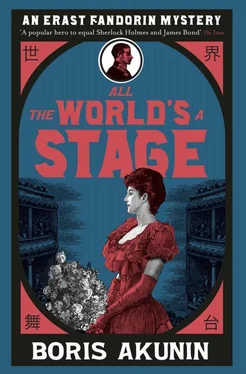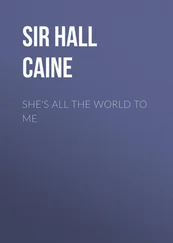‘That’s terrible, terrible,’ Eliza whispered. ‘Yes, something like that can never be forgiven.’
One actor could not possibly commit a more heinous crime against another. Anything could be expected of a man who was capable of such cruelty.
It was no accident, of course, that the cunning Noah Noaevich had brought the divorced couple together in the same company. According to his ‘theory of rupture’, the relations within a company should always be seething on the verge of an explosion. Envy, jealousy and even hatred – any strong emotions created a productive field of energy, which, with skilled management from the director and the correct distribution of roles, was transmitted to the acting, lending it an authentic vitality.
‘You know, Eliza,’ Reginina carried on, whispering, ‘I’m not like the others, I don’t envy your success in the least. Ah, there was a time when I made the audience faint with passion. Of course, my present line of characters has its own charms too. But let me tell you honestly, as a friend, that the admirers are the thing that is hardest to manage without. When you play the heroines, the persistent suitors who pursue you everywhere like a pack of hounds are annoying. But afterwards, how badly you miss this – pardon my vulgarity – gaggle of young studs! Oh, you have yet to learn that with age feelings – and sensuality, sensuality – do not grow weaker, but stronger. How sweet and fresh that Cherubino of yours in a hussar’s uniform is! I mean Volodenka Limbach. Why not give him to me, it won’t be any loss to you.’
Although this was spoken in jest, Eliza had frowned. So rumours were already going round? Had someone seen the boy trying to get into her window? What a disaster!
‘He’s not mine at all. You can take him and keep him, together with the sword, the spurs and all the rest of the trappings! Excuse me, Vasilisa Prokofievna, I’ll go and rehearse my part. Or else Stern will come back and start abusing me.’
She changed seats and opened her folder, but just then Serafima Aphrodisina sat down beside her and started babbling.
‘Kostya Shiftsky’s run off. Said he was dashing back to the Madrid. Supposedly he left the folder with his part there. He’s lying, probably. He always lies, you can’t believe anything he says. But where did you go this morning? I knocked, but you weren’t in your room. I wanted to borrow the diamante clip for my hat, it’s delightful, and you don’t wear it anyway. So where were you?’
Cheerful, bright and thoroughly down to earth, without any inhibitions or duplicity, Serafima had a salutary effect on Eliza’s tormented nerves. It’s a rare thing in the theatre for two actresses not to become rivals, but there was nothing of that sort between them. With her innate common sense, Aphrodisina explained this very simply. ‘You’re attractive to one kind of man, and I’m attractive to a different kind,’ she said once. ‘You’re good at playing sad parts, and I’m good at playing jolly ones. There’s nothing for us to quarrel over, either on the stage or in real life. They pay you more, of course, but then I’m younger.’ Serafima was sweet and spontaneous, a little bit greedy for money, clothes and trinkets, but then at her age that was all understandable and excusable.
Eliza put her arm round Serafima’s shoulders.
‘I went out for a walk. I woke up early and couldn’t sleep.’
‘For a walk? Alone? Or with someone else?’ Aphrodisina asked breezily. She adored secrets of the heart, affairs and all sorts of provocative subjects.
‘Don’t tell her anything, Eliza,’ said Xanthippe Vulpinova, walking across to them. Here was an individual who simply could not watch calmly while people had a friendly, cheerful conversation. ‘Have you noticed that this party here is always trying to pry something out of you and spying on you? The moment you went away just now, she stuck her nose in your notebook.’
‘Don’t you tell lies!’ Aphrodisina exclaimed, jumping to her feet with tears immediately welling up in her cornflower-blue eyes. ‘You should be ashamed of yourself! I just took the pencil out of it for a moment. I had to make a note on my part, and my pencil broke!’
‘You’re the one who’s always spying on everyone,’ Eliza told the ‘villainess’ angrily. ‘And worst of all, you didn’t even hear what we were talking about, you just butted in.’
That was all that Vulpinova needed. She thrust one bony, pointed fist against her side, leaned down over Eliza and proclaimed stridently:
‘Attention please! I call all of you to witness! This individual has just called me a spy! Of course, I’m only a little person, I don’t play any leading roles, but I do have my rights! I demand a comrades’ court, as specified in our statutes! No one has the right to insult the actors with impunity!’
She got her way. Everyone huddled together around the uproar. But Eliza had no need to defend herself, defenders appeared spontaneously. Good-hearted Gullibin tried to make the troublemaker see sense. And a second faithful champion, Georges Nonarikin, shielded the lady against attack.
‘In the director’s absence, his authority devolves on me!’ he declared proudly. ‘And I ask you, Madam Vulpinova, not to shout. The statutes include a clause about misconduct and violation of discipline during a rehearsal!’
Xanthippe immediately switched her attention to the new target; it was basically all the same to her who she wrangled with.
‘Ah, the Knight of the Mournful Visage! Why are you wandering about with Lopakhin’s part, like some nincompoop with a fancy embroidered feed-bag? You’ll see your own ears before you ever get to play that part. Because you haven’t got an ounce of talent! The general cook and bottle washer!’
Nonarikin turned completely white at this insult, but someone came to his defence in turn. Zoya Comedina jumped up onto a chair – obviously so that she could be seen more clearly – and yelled out with all her might:
‘Don’t you dare talk to him like that! Don’t listen to her, Georges. You’re a brilliant actor!’
This despairing appeal defused the tension and there were peals of laughter.
‘What a couple, a real sight for sore eyes,’ Vulpinova crooned happily. ‘You should sit on his shoulder, my dear. And you could go off round the courtyards and the streets singing Beethoven’s song “Me and My Marmot”.’
The imitation she gave of Comedina sitting on Nonarikin’s shoulder and him turning his hurdy-gurdy and singing was so funny that the laughter grew even louder.
For some reason the unfortunate assistant director was not furious with the troublemaker, but with his uninvited intercessor.
‘Who asked you to interfere?’ he asked her resentfully. ‘Everyone has to put their spoke in!’
And he withdrew from the scene.
Eliza sighed. Life was returning to normal. Everything as usual. The ‘Theory of Rupture’ was still in operation. Only Emeraldov wasn’t here…
She felt sorry for the little ‘principal boy’, who was just left there, abandoned on the chair, where she squatted down, looking like a little sparrow with its feathers ruffled up.
‘Why are you so blatant about it, men don’t like that,’ Eliza said gently, moving over to sit by Zoya. ‘Do you like Georges?’
‘We’re made for each other, but he doesn’t understand it,’ Comedina complained in a quiet voice. ‘Actually, I ought to hate you. When you’re there, all the men turn towards you, like sunflowers turning towards the sun. Do you think I can’t see that he finds my interest irksome, even offensive? I may play comic parts, but I’m not stupid.’
‘Why did you interfere?’
‘He’s so proud, and so unhappy. He has so much passion going to waste inside him. I see that sort of thing very clearly. I don’t need much, after all. I’m not you, I’m not pampered.’ Zoya bared her teeth in a clownish grin. ‘Oh, my demands on life are diminutive, and my demands on love are microscopic. To match my own size.’ She pulled a face and slapped herself on the top of her head. ‘I’d be satisfied with a smile and a kind word – even just occasionally. I’m not the kind that men love. I’m the kind that they allow to love them, as a special grace and favour. And then not always.’
Читать дальше









